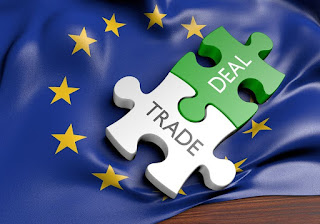What is the Trade and Cooperation Agreement (TCA) and how does it achieve the goals of Brexit?
Brexit is a highly discussed topic in general media. What is less discussed is the TCA – the agreement which legally determines the relationship between the UK and EU.
What is the TCA?
The TCA is a bilateral free trade agreement. Adoption of this arrangement ended the UK’s membership to the single market and customs union, allowing the UK to negotiate trade with third parties. The agreement provides for free trade in goods and limited mutual market access in services with the EU. It also provides for cooperation mechanisms in a range of policy areas and transitional provisions on sensitive areas (such as fisheries in the UK context). Most importantly for the UK’s goals of ‘taking back control’, it ends free movement of persons, most of the EU’s law enforcement and security cooperation with F and the ECJ’s authority in dispute resolution.
Analysis of the TCA
Positives of the TCA include i) regaining greater sovereignty through the limited influence of the ECJ, free trade with third parties and an end to free movement of persons; ii) a retainment of zero tariffs on goods and; iii) slightly more flexibility in terms of trade barriers than before (Art. Goods 7 allows for charges on fees and formalities of exports, not previously allowed in Art. 30 TFEU. Art. Goods 13 and 14 permit licensing arrangements not previously allowed under Art. 34 TFEU).
However, the rules under the TCA are on balance less than desirable. First, tariff free access is dependent on compliance with ‘rules of origin.’ Goods must originate from the UK in order to benefit from tariff free access. Checks on origin can be very onerous. Many exporters would rather pay a tariff because it is too expensive to prove the origin. For goods with high tariffs – such as sauerkraut and olives at 16% - the cost can end up being passed on to the consumer, resulting in expensive goods. Second, the TCA fails to guarantee mutual recognition of conformity assessment - leading to extortionate border checks which are inefficient. Third, the TCA fails to facilitate trade of services – it does not allow automatic mutual recognition of professional qualifications, nor are musicians nor art performers able to travel visa free into the EU.
Overall, an agreement between the UK and the EU was always going to require a certain level of compromise from both parties. Whilst the TCA is not perfect, it does go a long way in achieving the UK’s aims. Unlike the EU’s agreement with Canada, the UK has stayed firm in excluding a free movement of persons provision. The UK has also maintained its ability to trade and negotiate freely with third parties whilst maintaining tariff free access to the EU. It is not out of the question to forsee a day where the ‘rules of origin’ checks will eventually become smoother and more efficient due to familiarity over time. Overall, it does appear that the TCA achieves the goals of Brexit. What is left for debate is whether the accompanying Northern Irish Protocol will achieve the same fate.
Law Tutors Online, UK Law Tutor, UK Law Notes, Manchester Law Tutor, Birmingham Law Tutor, Nottingham Law Tutor, Oxford Law Tutor, Cambridge Law Tutor, New York Law Tutor, Sydney Law Tutor, Singapore Law Tutor, Hong Kong Law Tutor, London Tutors, Top Tutors Online and London Law Tutor are trading names of London Law Tutor Ltd. which is a company registered in England and Wales. Company Registration Number: 08253481. VAT Registration Number: 160291824 Registered Data Controller: ZA236376 Registered office: Berkeley Square House, Berkeley Square, London, UK W1J 6BD. All Rights Reserved. Copyright © 2012-2024.


